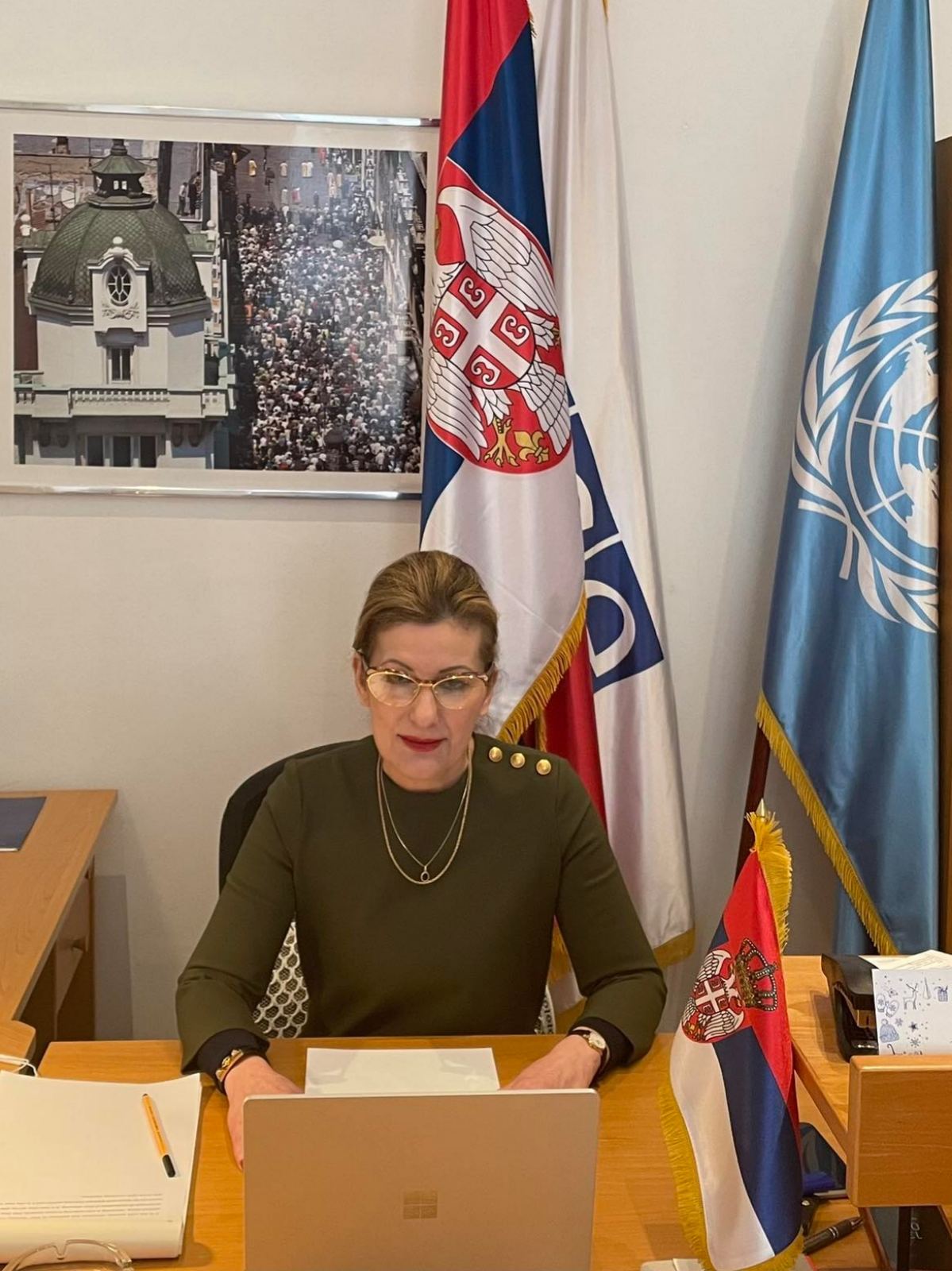
Madam Chairperson,
We welcome the Acting Head of the OSCE Mission in Kosovo Kilian Wahl to the Permanent Council and thank him for his report. Serbia supports the Mission, established in accordance with the UN SC Resolution 1244 and therefore duty bound to operate in a status neutral manner. We especially value OMIK’s and its five regional offices’ quality reporting and follow-up on cases with an inter-ethnic component.
In circumstances of the COVID-19 pandemic and related operational difficulties, we commend the Mission’s efforts to assist the local population.
Madam Chairperson,
First, on the Belgrade-Priština dialogue:
The establishment of the Community of Serb-majority Municipalities is an obligation guaranteed by all signatories of the 2013 Brussels Agreement, including the EU. We are once again forced to state the obvious: Agreements cannot be implemented selectively according to Priština’s domestic political agenda. Furthermore, recent statements that “the Belgrade- Priština dialogue is only a sixth or seventh priority”, or in the best case a fourth priority, and then that “a step back is needed in the dialogue” clearly diminish prospects for implementing previously agreed provisions and continuation of the dialogue.
Repeated calls to both parties to engage in meaningful dialogue are inappropriate since one side has already done so and the other has not. Belgrade’s readiness to engage in dialogue in a good faith remains steadfast.
Regrettably, the line chosen by Priština undermines not only the dialogue, but also long-standing efforts of the international community in the post conflict settlement. Threats that Priština would opt for a referendum on a union with Albania “if Kosovo had not entered the UN and become NATO member and EU candidate within 5 years” produced only a muted reaction of the international community. I invite you to envisage the reaction if a similar redrawing of borders was propagated in another regional context.
Second, the situation on the ground:
The above mentioned contentious political narrative is also affecting the situation on the ground. Incidents targeting Serb returnees and their property increased in the reporting period. The number of returnees remains shamefully low. Identifying, let alone punishing, perpetrators remained slow and inadequate.
The 2020 European Commission Report underlined that an “increased follow-up of such incidents by judicial institutions is still needed”. The same report cited “the difficulty in implementation of human and fundamental rights legislation due to inadequate financial and other resources, limited political prioritization and a lack of coordination”.
Madam Chairperson,
Issues of coordination or resources are not the primary hindrance to respect of human rights. Deeply rooted intolerance toward non-majority communities is the core problem. As a step to promote tolerance, we welcome the Mission’s efforts to foster people to people contacts, particularly between young people, journalists and women parliamentarians. We appreciate OMIK and HCNM assistance to Priština’s Faculty of Philology to finally re-establish South Slavic studies with modules in Serbian and to meet labor market needs in linguistics, translation, teaching, and inter-cultural communication.
We also value the Mission’s efforts in resolving property issues of internally displaced persons. However, despite some progress, it is clear that the local Property Comparison and Verification Agency does not perform as an effective mechanism for repossession of usurped property. The local Ministry of Communities and Returns and the associations of affected displaced persons were excluded from the process of amending the relevant Law.
Protection of fundamental rights and freedoms of displaced persons is impossible without safeguarding their property and housing rights. We encourage the Mission to continue engaging directly with the IDPs’ associations in central Serbia, to address their concerns and work directly with them on their return.
Madam Chairperson,
The Report points at the continued desecration of cemeteries and historical monuments, burglary and damage to cultural and religious heritage. Local institutions ignore court rulings on property rights of the Serbian Orthodox Church. The so-called Constitutional Court confirmed, way back in 2016, the ownership of UNESCO Heritage Site Visoki Dečani over 24 hectares of the land in the vicinity of the Monastery. However, the authorities are still refusing to respond to the request of Serbian Orthodox Church to register its land.
We therefore encourage the Mission to continue monitoring institutional responses to such attacks and compliance with court decisions, and to publish a thematic report on threats to the Serbian and other communities’ cultural and religious heritage.
The arbitrary denial of visits of officials from Central Serbia continued throughout the reporting period, without plausible legal explanation. Journalists from central Serbia were denied entry on February 18th without valid clarification. This undermines the Mission’s attempts to improve media standards.
Finally, the way forward:
Only a sincere commitment by all relevant actors to approach outstanding issues in good faith with the aim of normalizing relations and respecting fundamental human rights and freedoms can guarantee reconciliation, coexistence and respect of diversity.
To quote President Aleksandar Vučić, who met yesterday evening EU Special Representative for Belgrade-Priština Dialogue Miroslav Lajčák: “Serbia supports Lajčák's activities and intentions to reach a compromise solution. We believe that a compromise means no one gets everything and everyone gets enough. It means dissatisfaction or partial satisfaction for both sides, but without an ultimatum and imposed solutions”.
Let me finally address some statements we have heard today. Regarding the informal meetings with the Head of Mission and so called the recipient of the OSCE assistance on the ground, we believe it is necessary to be precise: there is no established practice of inviting officials from Priština. There were individual cases, and they were contested. We firmly stand by our position that these calls are inacceptable, go against the status-neutral position of the Organization to Kosovo and Metohija and they also deepen the divisions in the OSCE.
Thank you.